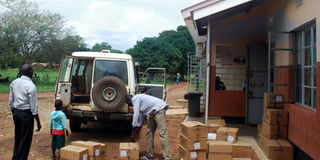HIV/Aids patients surviving on borrowed drugs in Pader

Insufficient. Staff of Pajule Health Centre IV in Pader District offload borrowed ARV drugs from an ambulance recently. The facility has been relying on borrowed drugs from other health facilities for three months. PHOTO BY TOBBIAS JOLLY OWINY.
What you need to know:
- Inadequate supply. Pajule Health Centre IV, the biggest health facility in the district, last received ARVs from the National Medical Stores in July.
- The circular issued and signed by the then acting Director General of Health Services, Dr Anthony Mbonye, directed overstocked health facilities with ART to redistribute and share them with those in critical need of the drugs, and that new patients should only be started on ART after adequate counselling and treatment preparation.
- Recently, the ministry of Health directed all health facilities across the country to restrict the quantity of ART drugs issued to HIV/Aids patients, citing artificial shortage of ART drugs.
Pader: A total of 3,369 people in Pader District living with HIV/Aids have gone without their medication (Antiretroviral drugs) for the last three months, Daily Monitor has learnt.
According to records at Pajule Health Centre IV, which is the biggest health facility in the district, they last received ARVs from the National Medical Stores (NMS) in July.
The next consignment had been expected between July 27 and August 24, and another between September 20 and October 19, but these have not been delivered yet.
Pajule Health Centre IV currently has a total population of 3,369 patients on ART medication.
Borrowing
According to Ms Roselyn Apila, the facility’s drug storekeeper, the situation has now forced them to borrow ARV drugs from other facilities with surplus drugs and fewer HIV/Aids patients.
“At the moment, we are borrowing drugs like Lamivudine; which is only meant for adults. We are more worried for the children, breastfeeding and pregnant mothers who require Abacavir Sulphate/Aluvia and Fumarate de Tenofovir Disoproxil drugs yet we do not have them in place,” she noted.
Records show that Pajule Health Centre IV has a combined total of 175 expectant and breastfeeding mothers and 101 babies on ART medication.
When Daily Monitor visited the facility last week, its ambulance was seen offloading 17 boxes of assorted ARV (TDF/3TC EFV) drugs that had been borrowed from Acolpii barracks and Latanya health centre IIIs.
Ms Apila went on to state that they had been overwhelmed by the number of patients who flock the facility in need of ARV drugs yet the drugs are not there.

Mr Moses Kamabare, the NMS executive director said they have enough drugs in stores to supply every facility in the country. According to him, it is a big mistake for these facilities to give patients ART for five or even seven months and others miss it.
“Drugs that we borrow are not enough to adequately sustain all the patients at the facility. Like today, we only borrowed a few boxes, which will be enough for only about 700 patients,” she noted.
She continued: “When they [patients] come here and go back without getting the drugs, it pains us a lot because they may become drug-resistant, especially those with TB,”
Dr Anna Apio, the Pader District health officer, said the situation of HIV/Aids patients on medication was not any better because of limited ART drug supplies.
“It was only on October 10 that we received ART drugs from NMS and those were not even enough for the patients enrolled on medication,” Dr Apio said on Monday.
She noted that Pajule Health Centre IV and Pader Health Centre III are the most affected by the shortages of drugs since they have the biggest number of HIV/Aids patients enrolled on medication.
“We are going to compile our records and send them to NMS again so that they can avail us more drugs.” She noted.
“Borrowing drugs from other facilities is not reliable at all and I think we have to take another course as leaders, and do something to save our people, otherwise we will fail to save their lives when they become resistant to the drugs,” Mr Denis Sebunya, the Pader Chief Administrative Officer, said.
When Daily Monitor contacted Mr Moses Kamabare, the NMS executive director, he denied claims that the country was facing shortage of ART drugs.
“We have enough drugs in stores to supply every facility in the country. It is a big mistake that these facilities give patients ART for five or even seven months and others miss it,” Mr Kamabare said.
He noted that the directive [by the Ministry of Health] was to control and avoid artificial shortage since ART drugs were being mismanaged by the facilities.
Ministry directive
Recently, the ministry of Health directed all health facilities across the country to restrict the quantity of ART drugs issued to HIV/Aids patients, citing artificial shortage of ART drugs.
“...issue no more than two months of stock of ART to stable patients, a number of health facilities are issuing up to six months of ARV to patients, while many others have failed to access this treatment. This is causing disruption of the supply chain systems and service delivery in the country,” the circular reads in part.
The circular issued and signed by the then acting Director General of Health Services, Dr Anthony Mbonye, directed overstocked health facilities with ART to redistribute and share them with those in critical need of the drugs, and that new patients should only be started on ART after adequate counselling and treatment preparation.
Patients protest
Not happy. On Independence Day, more than 100 HIV/Aids patients enrolled on ART within Pader Town Council stormed the streets as they protested the delayed delivery of the drugs.
The demonstrating patients, who held placards and banners, demanded that government and the National Medical Stores take immediate action and supply the district with adequate ART drugs.



